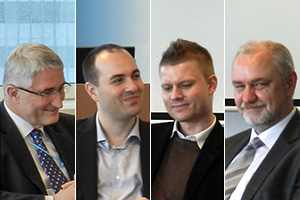
On 10 April 2014, the Vienna Center for Disarmament and Non-Proliferation (VCDNP) and the Institute of Political Studies (IPS) of Charles University in Prague co-hosted a seminar entitled "Global Zero and Beyond: Theory, Politics, and Regional Perspectives," to explore the implications, next steps, and challenges of the broad disarmament agenda outlined by President Barack Obama in his 2009 Prague speech. The speakers included Ambassador Vladimír Galuska, Head of the Permanent Mission of the Czech Republic to the UN, OSCE and other International Organizations in Vienna, Dr. Nik Hynek from Charles University/Metropolitan University Prague, Mr. Michal Smetana from Charles University, and Dr. Nikolai Sokov, Senior Fellow at VCDNP. Elena Sokova, VCDNP Executive Director, moderated the event.

The speakers drew largely from the discussions within a series of conferences held by the Institute of International Relations (Prague), the Charles University, and the Metropolitan University Prague with support of the Foreign Ministry of the Czech Republic, which sought to address a wide range of aspects of the so-called "Prague Agenda." The project organizers held the third conference of this series in Prague last fall, and they are now producing an edited volume that will include contributions from participants of these conferences.

Ambassador Vladimír Galuska outlined developments in nuclear non-proliferation and disarmament since President Obama's 2009 speech. He pointed out significant positive developments, such as the signing of the US-Russian New Strategic Arms Reduction Treaty in Prague in 2010, as well as positive cooperation on a number of outstanding non-proliferation issues. He also noted recent challenges, such as the failure to convene a conference on a Middle East Weapons of Mass Destruction-Free Zone in 2012. The project led by Czech scholars, he concluded, represents an important contribution to the global nuclear disarmament and non-proliferation agenda.
Michal Smetana explained that the broad nuclear disarmament agenda outlined in President Obama's Prague speech sparked a broad academic debate on both the attainability of—as well as the specific steps toward—the goal of a nuclear weapon-free world. At the same time, less attention has been paid to considering the consequences of nuclear abolition, including its impact on the international system and on global and regional stability. The project sought to address that deficiency, and the forthcoming edited volume will reflect its findings.

Dr. Nik Hynek explained that the participating scholars wanted to make a theoretical—but also practice-oriented—contribution to the debate on the elimination of nuclear weapons, both in the conferences and with the ensuing book. The three Prague Agenda conferences followed a format that brought together both academics and practitioners, and the book develops a theoretically grounded empirical analysis without taking any ideological or political position; it combines the theoretical and practical elements as well as the global and the regional approaches. The volume will also include both proponents of the elimination of nuclear weapons and its skeptics. The inclusive nature of the project is expected to enrich the debate and put it on a solid theoretical footing. Dr. Hynek reviewed the structure of the future book, which they expect to publish in the first half of 2015. He also shared the plan to convene the fourth conference of the project in Prague in the fall of 2014, which will bring together the study's authors for a review and discussion.
One such author, Dr. Nikolai Sokov, said that while nuclear weapons represent a global problem, decision on whether these weapons should be eliminated is made nationally by each nuclear weapon state. Such a decision depends, to a large extent, on the perception of the nature of the future international system, namely, whether the world will be sufficiently safe without the terror instilled by the most terrible weapon ever invented by humans. A complicating factor is that the perception of the future world is not necessarily rational. The international system is still in the stage of transition from the Cold War and its shape is not yet clear. States that feel reasonably comfortable in today's world, such as the United States and its allies, are more predisposed to favorably consider eliminating nuclear weapons, albeit perhaps slowly, or, at least significantly reduce their role. In contrast, states that are less comfortable, including—but not limited to—Russia, are more reluctant to part with that ultimate deterrence. The ongoing crisis in and over Ukraine, he argued, demonstrates Moscow's dissatisfaction with the existing shape of the international system. Consequently, the central question is not how the world will look without nuclear weapons, but rather how should we change the world to make the elimination of nuclear weapons possible.